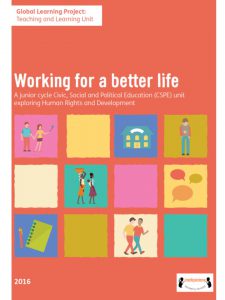Despite some positive developments in the portrayal of people living in poverty in developing world contexts, e.g., Dochas Code of Conduct on Images and Messages, the Irish public are often exposed to generalised and even stereotypical information and images on the subject. This resource was developed to support junior cycle students to develop the skills necessary to question the one dimensional perspective which is often presented in the media and elsewhere. In this unit, students:
- begin by discussing learning outcomes, and setting their personal learning goals.
- are introduced to the UDHR, categorise different types or human rights, and consider the universal and indivisible nature of these rights.
- Consider the causes and consequences of stereotyping are considered.
- engage with a case study about women who work as housemaids in Ethiopia, learning how they are working through Associations to gain an education and improve their lives.
- rank the various active learning methodologies experienced in the Unit, then plan and carry out a teaching session with peers or younger students, using what they have learned about the UDHR and Ethiopian housemaids.
The project brief includes suggestions for the organization of the teaching sessions, and a set of success criteria to be shared with students. The unit concludes with activities to facilitate reflection, review and evaluation of learning outcomes, classwork and the peer teaching project.
Each lesson includes a set of step-by-step instructions for teachers, with activities employing a wide range of active teaching methodologies. Student worksheets for individual, pair and small group work, and teacher resource sheets with background information are available for each lesson.
Students should be able to:
- identify examples of social, cultural, language, economic, civic, religious, environmental and political rights
- show an appreciation of their responsibility to promote and defend their individual human rights and those of others
- examine case studies or personal testimonies of people experiencing poverty or inequality from different contexts and countries and how they are working to overcome this
- debate the pros and cons of media freedom
- reflect on their learning
An assessment for learning strategy has been designed for integration into lessons and the peer teaching project can be used as the basis for a Report on Action Project (70-hour CSPE programme) or the assessment of learning task outlined in the CSPE short course.
Working for a better life has been developed by APA in collaboration with a practicing teacher, and has been piloted extensively, with student participation evident in the quotes sprinkled throughout. Working for a better life supports teaching and learning linked to the concepts of Human Rights and Responsibilities and Development (junior cycle Civic, Social and Political Education 70-hour programme), and designed to meet CSPE short course specification learning outcomes, as follows: Strand One: Rights and Responsibilities (1.9, 1.11, 1.12); Strand Two: Local and Global Citizenship (2.5, 2.12); and, Strand Three: Exploring Democracy (3.11, 3.13).
……………………………………
Working for a better life is part of a series of curriculum units produced by APA in collaboration teachers from APA’s school network, and published by the CDETB Curriculum Development Unit. Working for a better life has been produced with assistance from the European Union.
Suggested use
The unit can also be used to support teaching and learning in Civic, Social and Political Education (CSPE), and to contribute to the delivery of Wellbeing at junior cycle level. The unit could also be used in citizenship, social justice or development education module for Transition Year students.
Further reading
- A Partnership with Africa (2016), The Outsiders: Children living in direct provision. CDETB Curriculum Development Unit: Dublin.
- A Partnership with Africa (2016), Learning to look: Visual literacy in our interdependent world. CDETB Curriculum Development Unit: Dublin.

